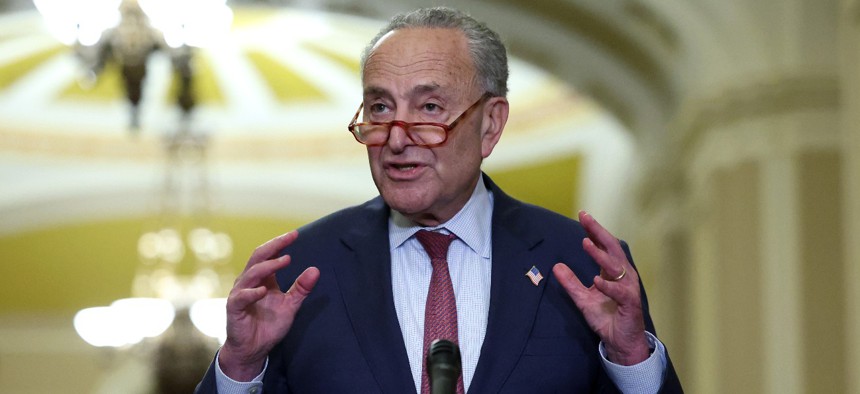
Sen. Chuck Schumer, D-N.Y., said senators are compromising on spending priorities and the appropriations bills are moving along exactly as they should, in that chamber. Kevin Dietsch/Getty Images
The Senate is on a bipartisan glidepath toward avoiding a shutdown, Schumer says
The way forward is still complicated by the House, which is pushing partisan spending bills along party lines.
The Senate continues to advance spending bills without controversy and with bipartisan support, offering hope that lawmakers will avoid a lapse in appropriations this fall.
The Senate Appropriations Committee approved three more fiscal 2024 funding measures on Thursday, two of which—those funding the departments of Transportation and Housing and Urban Development, as well as the Energy Department—received unanimous, 29-0 votes. The third, which would set spending levels for the State Department and the U.S. Agency for International Development, received just two dissenting votes.
The panel has now approved eight of the 12 annual must-pass spending measures, most of which have won unanimous approval. Sen. Patty Murray, D-Wash., who chairs the appropriations committee, announced Thursday her panel would hold votes on the final four funding packages next week. Murray said ahead of Thursday’s votes that she was focusing on passing bills “that can actually be signed into law.”
“These are strong bills that show Congress can actually work in a bipartisan way to make tough decisions and, ultimately, critical investments our communities are counting on,” Murray said. “We have more work ahead, and I am not going to stop pushing to use every tool I can to deliver the strongest bills possible.”
The committee’s success led Senate leadership to express optimism that Congress can avoid the usual last-minute theatrics and deal making that typically accompany the end of each fiscal year.
“This is never an easy process,” said Senate Majority Leader Chuck Schumer, D-N.Y., on the Senate floor Thursday. “But hats off to Chair Murray and Vice Chair [Susan] Collins [R-Maine]. They're working really well together and we're on track to pass all of our appropriations bills through committee, through regular order, with strong bipartisan support.”
He added the chamber is “moving forward on a good path.”
“It is hard to do, but they're doing a great job,” Schumer said. “And it's precisely how the appropriations process should work: both sides coming together, finding common ground, advancing bills that invest in American families, keep our community safe and keep our government open.”
The Senate is moving bills in line with spending caps set by the 2023 Fiscal Responsibility Act, which President Biden negotiated with House Republicans in order to raise the debt ceiling. While that deal aimed to keep overall non-defense discretionary spending flat compared to fiscal 2023, several of the bills would provide small increases for the agencies they fund.
Senate Republicans initially balked at the Democrat-proposed allocations for the 12 bills, but, according to a Roll Call report, have since agreed to a $14 billion supplemental package to boost spending at the departments of Homeland Security, Defense and other agencies.
House Republicans, meanwhile, are moving forward with spending bills far below the levels prescribed by the debt deal they negotiated with Biden. Their measures would lead to drastic cuts at agencies across government and create a significant hurdle to shepherding spending bills to Biden’s desk before a shutdown would occur in October. If Congress fails to pass appropriations bills by Jan. 1, an automatic continuing resolution would kick in for the rest of the year at 1% less than the funding level each federal office and program received in fiscal 2023.
Democrats have accused Republicans of torpedoing the just-passed budget deal and surrendering any leverage Republicans would have in future spending negotiations with the Senate. The approach will “all but guarantee a shutdown in October,” Rep. Rosa DeLauro, D-Conn., the top Democratic appropriator, said last week.
Unlike the House, the Senate requires bipartisan support to pass its appropriations measures and clear the 60-vote threshold. While none of the bills have yet been put on the floor, the near unanimous support they have won in committee signals an easy process going forward.
The House Appropriations Committee has approved 10 of the 12 spending bills, all largely along party-line votes. House Speaker Kevin McCarthy, R-Calif., said on Wednesday he planned to bring those to the House floor soon, adding his intention was to have the process complete before current funding expires on Sept. 30. Without commenting on the vast differences between the two sets of bills, McCarthy called it “a positive” that the Senate was already moving its spending measures.







